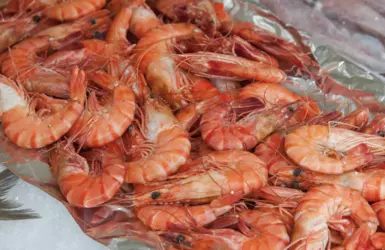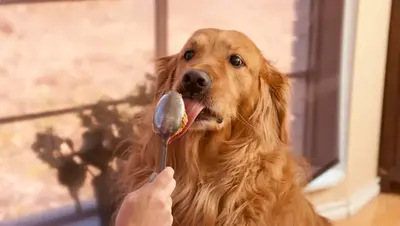Can Dogs Eat Prawns?
- 21 Dec 2023
- 3m read

Yes, dogs can eat prawns. However they should be served cooked, peeled and in small amounts.
Are Prawns Good for Dogs?
Prawns, rich in protein, vitamins, and minerals, offer several health benefits for humans. However, when it comes to dogs, it's crucial to remember that their digestive system is different to ours.
Prawns, when offered in moderation and properly prepared, prawns can provide several potential benefits for dogs.
Nutrient-rich
Prawns are a good source of protein, essential for muscle development and overall health in dogs.
Omega-3 fatty acids
They contain omega-3 fatty acids, which contribute to a healthy coat, reducing inflammation, and supporting skin health in dogs.
Vitamins and minerals
Prawns contain vitamins such as B12 and minerals like selenium, aiding in immune system function and contributing to overall well-being.
Low in fat
They are relatively low in fat, making them a suitable protein option for dogs with weight management needs.
Variety in diet
Offering prawns occasionally can add variety to a dog's diet, making mealtime more enjoyable.
However, it's crucial to remember that while prawns offer potential benefits, each dog's tolerance and reaction to new foods can differ. Always introduce new foods slowly and in small portions, keeping an eye out for any adverse reactions or digestive issues.
Can Dogs Eat Cooked Prawns?
Cooked prawns can be a suitable treat for dogs when prepared without seasonings, oils, or additives. The cooking process eliminates potential bacteria that might be harmful to your pup's digestive system. Nevertheless, moderation is crucial to avoid any adverse reactions or digestive issues.
Can Dogs Eat Raw Prawns?
No, dogs should not eat raw prawns.
Raw prawns pose a higher risk of bacterial contamination and might lead to gastrointestinal upset in dogs. The potential presence of parasites or bacteria in raw seafood could be harmful to your dog's health. Therefore, it's recommended to serve prawns to dogs only after thorough cooking.
Can Dogs Eat Prawn Shells?
No, dogs should not eat prawn shells.
Prawn shells can present a choking hazard and may cause gastrointestinal obstructions in dogs. It's advisable to remove shells entirely before offering prawns to your furry friend to prevent any potential harm.
Can Dogs Eat Prawn Toast?
No, dogs should not eat prawn toast.
Prawn toast typically contains additional ingredients like bread and seasonings, which may not be suitable for dogs. The bread can be difficult for dogs to digest, and seasonings might cause adverse reactions. It's best to avoid offering prawn toast to your canine companion.
Can Dogs Eat Prawn Crackers?
No, dogs should not eat prawn crackers.
Prawn crackers are often deep-fried and contain ingredients like starch, which might not be ideal for dogs. The high-fat content and potential additives in prawn crackers make them unsuitable as a regular treat for dogs.
Can Dogs Eat Prawn Cocktail Crisps?
No, dogs should not eat prawn cocktail crisps.
Prawn cocktail crisps are processed snacks meant for human consumption and contain seasonings and additives that are not suitable for dogs. The high salt and seasoning content can be harmful to a dog's health. It's best to refrain from sharing these crisps with your furry friend.
How Many Prawns Can I Feed My Dog?
The quantity of prawns your dog can safely consume depends on various factors like size, breed, and individual tolerance. As a guideline, offer prawns in small portions as an occasional treat and monitor for any adverse reactions. Moderation is essential to prevent digestive issues or potential allergic reactions.
Prawns can be a flavourful addition to a dog's diet when served in moderation and prepared appropriately. Cooked prawns without seasonings or additives can be a safe occasional treat, while raw or processed prawn-based foods should be avoided due to potential health risks. Always consult your vet before introducing new foods to your dog's diet to ensure their safety and well-being.

.webp)


